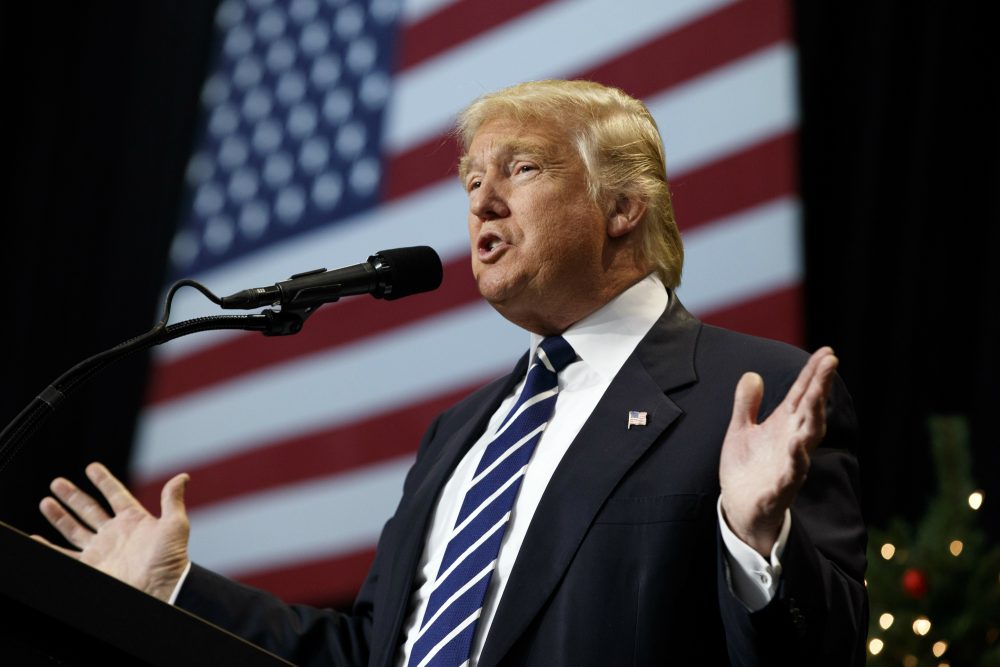Advertisement
Donald Trump And The Future Of 'Post-Truth' America

COMMENTARY
When the Oxford Dictionary anointed “post-truth” as their 2016 Word of the Year, few on this side of the pond needed an explanation. Donald Trump's loose relationship with the truth is well documented. His unflagging popularity and surprise victory confirmed that truth is no longer the fundamental building block of decision-making in America.
No one knew how well the concept of post-truth would transition from the campaign trail to the Oval Office — if at all. The more optimistic among us held out hope that, after Donald Trump was elected, he would become more susceptible to reason. After all, he said he'd behave differently as president — can’t we at least believe that?
[Donald Trump's] unflagging popularity and surprise victory confirmed that truth is no longer the fundamental building block of decision-making in America.
This week's developments put the lie to that notion, however, as we learned that post-truth Trump wasn’t just a campaign gimmick, but a glimpse of just how dangerous a Trump presidency could be.
On Fox News Sunday, President-elect Trump dismissed a Washington Post report about the CIA's conclusion that Russia intervened in the election to help Trump. His and his transition team's reaction — they all but accused the CIA of playing politics — was unprecedented but not surprising. Who wouldn’t expect Trump, a man who made sport of excoriating enemies and dissenters, to double down against an organization whose investigation's findings cast doubt upon the legitimacy of his victory?
The real news came later in the Fox interview, when Trump revealed that he will not receive daily briefings from intelligence officials on the most pressing geopolitical issues of the day. Instead, he will take these briefings, currently known as the President’s Daily Brief, weekly or as needed.
“You know, I'm, like, a smart person," Trump explained. "I don't have to be told the same thing and the same words every single day for the next eight years.”
Advertisement
Trump's statement isn't just presumptouous — eight years? — it is also the manifestation of post-truth in the new White House. In a post-truth world, feelings are fact. Trump has supreme confidence in his own judgment. His "truth" comes from his own gut feeling and life experience, his ego. His supporters, enraptured by his charisma and fed up with the status quo, accept Trump’s truth without question.
Critical thinking in America has become critically endangered. Consider “Pizzagate,”the fake news story that drove a man to bring an assault rifle to a Washington, D.C., pizza shop in order to rescue the sexually abused children Hillary Clinton was holding in tunnels beneath the store. (If you recoiled at that, then maybe all hope isn’t lost.)
The paradox of Trump is that, along with this supreme confidence comes a profound insecurity. He may deliver statements as fact, but his puerile defenses of them reveal most of all that he knows they cannot withstand examination, let alone criticism. His ruthless handling of those who dissent precludes or eclipses any critical discussion or argument. His cabinet picks, no team of rivals, reflect this. Trump, it seems, dares not even second guess himself in moments of quiet reflection, which of course assumes he has such moments.
The paradox of Trump is that, along with this supreme confidence comes a profound insecurity.
Rep. Devin Nunes (R-Calif.), the chairman of the House Intelligence Committee and a senior member of Trump’s transition team, said, “Look how many leaders he’s met with, how many phone calls he’s done, positions he’s filled. People who are being critical need to get a life.”
Trump’s intelligence won’t come from the careful, professional analysis of multiple sources, but from what a businessman gleans from meeting someone and looking them in the eye — the same technique that led George W. Bush to think Putin was “very straightforward and trustworthy.”
On "The Daily Show" this week, President Obama stressed the importance of daily intelligence briefings: “It doesn’t matter how smart you are, you have to have the best information possible to make the best decisions possible. If you’re not getting their perspective — their detailed perspective — then you are flying blind.”
Obama doesn’t have to tell Trump that. Trump knows. He is, like, a smart person, after all.
